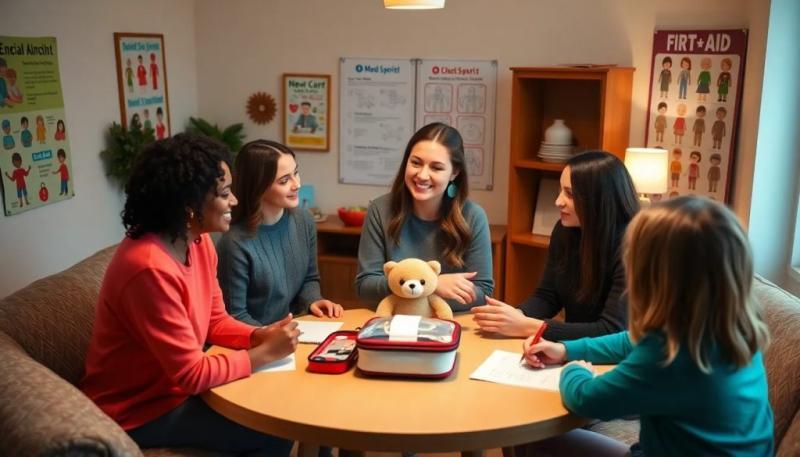When it comes to ensuring the safety and well-being of children in the care of babysitters, parents play a crucial role. Preparing babysitters for various medical conditions is essential, as it equips them with the knowledge and skills needed to handle emergencies effectively. This article will guide parents on how to prepare babysitters for medical conditions, focusing on key steps to ensure that caregivers are ready for any situation.
How to prepare babysitters for medical conditions
Understanding how to prepare babysitters for medical conditions involves sharing vital information and ensuring that sitters are equipped to handle emergencies. The process begins with selecting the right babysitter who is not only responsible but also trained in essential emergency protocols.Parents should prioritize finding a reliable babysitter within their community, ideally someone with experience and knowledge of CPR and first aid. Conducting interviews and checking references can help in assessing a babysitter’s capabilities. It’s also beneficial to choose older teenagers, as recommended by the American Academy of Pediatrics, who can display authority and responsibility when caring for children.Additionally, parents must communicate openly with their babysitter about any medical conditions, allergies, or specific needs that the children may have. This sets a foundation for ensuring that the babysitter is adequately prepared to manage potential health issues that may arise during their watch.What information should parents share with babysitters?
The information shared with babysitters should be comprehensive and structured to cover all essential aspects. Parents should provide details such as:- Emergency contacts: Include phone numbers for parents, local emergency services, and the children’s pediatrician.
- Medical history: Share any relevant medical conditions, allergies, or medications the children may require.
- House rules: Outline specific guidelines for behavior, bedtimes, and screen time.
- Emergency procedures: Explain what to do in case of specific medical emergencies, including signs to watch for.
How can parents ensure their babysitter is prepared for emergencies?
To ensure that babysitters are prepared for emergencies, parents can take several proactive steps:1. Training sessions: Encourage babysitters to attend first aid and CPR classes. This knowledge can be invaluable in emergency situations.2. Mock drills: Conduct practice scenarios to familiarize the babysitter with emergency procedures. This could include practicing how to respond to allergic reactions or other medical emergencies.3. Emergency plan: Create a clear and concise emergency action plan that outlines the steps to take in various situations. Provide a copy to the babysitter for easy reference.4. Regular check-ins: Maintain an open line of communication, checking in with the babysitter during their time with the children. This can help reinforce their confidence and ensure they feel supported.By implementing these strategies, parents can significantly boost the preparedness of their babysitters, fostering a safer environment for the children.What are the essential safety rules for babysitters?
Implementing safety rules is crucial for babysitters to follow. Here are some essential guidelines:- Stay informed about the children’s needs and any medical conditions.
- Never leave children unattended, especially in potentially dangerous environments.
- Know the location of first aid kits and how to access them quickly in an emergency.
- Limit the use of mobile devices to avoid distractions while supervising children.
Why is it important to meet your babysitter beforehand?
Meeting babysitters before they begin working is a critical step for various reasons. Firstly, it allows parents to assess the babysitter’s demeanor and ensure they feel comfortable with them caring for their children. Another important aspect of this meeting is discussing any medical conditions or special needs the children might have. This discussion helps the babysitter feel more prepared and knowledgeable, reducing anxiety.Lastly, understanding the babysitter's experience and training can help parents gauge their readiness for potential emergencies. This initial meeting establishes trust and sets the stage for open communication.What should be included in a babysitter's emergency checklist?
An emergency checklist for babysitters should be comprehensive, ensuring they have all the necessary information at hand. Here’s what it should include:- Contact information: Parents’ cell phone numbers, emergency services, and pediatrician’s contact.
- Health details: Specific allergies, medications, and any chronic conditions.
- Emergency procedures: Step-by-step instructions for handling various medical emergencies.
- Household safety: Important locations such as first aid kits, fire extinguishers, and escape routes.
How to discuss medical conditions with your babysitter?
Discussing medical conditions with babysitters is crucial for ensuring the safety of children. Parents should approach this conversation openly and clearly. Start by explaining the specific medical conditions in detail, including symptoms to watch for and appropriate responses.It’s also helpful to share any personal experiences or insights related to managing these conditions. This not only educates the babysitter but also builds a sense of trust as they understand the care involved. Finally, encourage the babysitter to ask questions. This dialogue can clarify any doubts they might have and reinforce their preparedness for potential medical issues.Frequently asked questions about babysitting preparedness
Questions related to babysitter preparedness for emergencies
What to prep for a babysitter?
When preparing for a babysitter, parents should focus on clarity and completeness. It is essential to provide all necessary information, including emergency contacts, medical conditions, and household rules. Having an emergency checklist can also greatly enhance the babysitter's preparedness, ensuring all critical information is easily accessible.What emergency information does a babysitter need from parents?
A babysitter needs various types of emergency information from parents. This includes contact numbers for parents and local emergency services, a list of any allergies the children have, and medical conditions that may require immediate attention. Providing this information creates a safety net for the babysitter, allowing them to act swiftly in case of an emergency.What is the number one rule in babysitting?
The number one rule in babysitting is to ensure the safety and well-being of the children at all times. This encompasses supervising the children, being aware of potential dangers in the environment, and being prepared to respond to any emergencies that may arise. This primary focus fosters a secure atmosphere for both the babysitter and the children.Is $10 an hour good for babysitting?
The pay for babysitting can vary widely based on factors such as location, the babysitter's experience, and the number of children being cared for. While $10 an hour may be acceptable in some areas, it may be considered low in others. It’s essential to consider the going rate in your community and the specific responsibilities involved when determining an appropriate wage.Para ampliar este tema, te presentamos un video que te enseñará cómo preparar a los cuidadores para manejar condiciones médicas en los niños.




